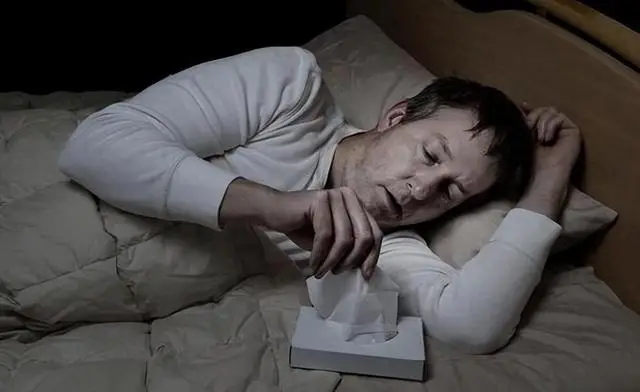Nighttime should be the most peaceful time of day. But for some, nighttime becomes a time when their bodies "sound the alarm." Some people wake up in the middle of the night with sweaty clothes, some cough uncontrollably, some experience pain no matter how they lie down, and others wake up inexplicably and find it difficult to fall back asleep.
These seemingly minor ailments may actually hide bigger problems. People often say, "We're too busy during the day to listen to our bodies. The night is when the truth comes out."
That's actually quite true. When the body is sick, it's most vulnerable to being exposed at night.
Not all cancers manifest themselves openly. Sometimes, they quietly alert us with subtle, seemingly insignificant signs. Often, it starts with discomfort at night.
Medically speaking, early-stage cancer is often highly insidious and difficult to detect, but it's not without warning signs. If someone repeatedly experiences these symptoms at night, they shouldn't ignore them as minor ailments.

I. Night Sweats: Not Heat, But Cancer "Detoxifying"?
Sweating is detoxification?
Not necessarily. Waking up at night to find your clothes and pillow soaked is not something everyone experiences. Especially now that it's autumn, the nights are cool, and you shouldn't sweat so much.
But some people experience this every night, even needing to change clothes several times before they can finally fall back asleep. This excessive sweating is medically termed "night sweats." It's not due to being too hot or covered up too much; rather, it's the body's abnormal temperature regulation. Some cancers, such as lymphoma and leukemia, are prone to night sweats in their early stages, especially during sleep.

Studies indicate that about one-third of Hodgkin's lymphoma patients experience night sweats before diagnosis. It's not the body's way of "detoxifying," but rather an abnormal temperature regulation caused by excessive release of inflammatory cytokines. In the process of fighting abnormal cells, the body's metabolic level changes drastically, leading to autonomic nervous system disorders.
Like a broken thermostat, it doesn't know whether it should be hot or cold. Night sweats may also be accompanied by low-grade fever, weight loss, and fatigue; if they occur together, extra caution is needed. Unfortunately, most people attribute it to the weather, internal heat, or menopause, delaying early detection.
II. Persistent Coughing During Sleep: Coughing Isn't a Cold, Could It Be Lung Cancer's "Greeting"?
A cough without a cold may not necessarily be bronchitis. Many people say they've been coughing for weeks due to poor air quality or catching a chill. However, if the cough worsens every night, is uncomfortable lying flat, or even when lying on your side, and you're woken up several times by coughing, you should pay attention.
Persistent nighttime coughing could indicate a lung problem. Early-stage lung cancer, especially peripheral lung cancer, often doesn't present with obvious symptoms. However, if the tumor is close to the airway or hilum, it can stimulate the cough reflex arc, leading to frequent coughing.
Data shows that about 70% of newly diagnosed lung cancer patients present with chronic cough as their first symptom. Frequent nighttime coughing, besides being caused by postural reflux of lung secretions, could also be due to a tumor affecting the airway mucosa.

Furthermore, some people find cough suppressants ineffective, experience chest pain, or have blood in their sputum—these are all warning signs. Not all coughs require "fighting a cold." A persistent, ineffective cough, especially severe at night, warrants imaging to rule out lung tumors.
III. Nighttime Pain: Worsening Pain at Night – Is it Cancer Cells at Play?
An even more distressing type of pain is pain that worsens at night. Some people feel fine when lying down, but as they drift off to sleep, back pain, limb aches and pains become increasingly pronounced, making even turning over difficult and waking them up in pain. This "pain while sleeping" is not like ordinary fatigue, nor does it resemble arthritis or a herniated disc.
Some cancers, such as bone metastases, pancreatic cancer, and advanced stomach cancer, experience increased pain at night, primarily because tumor cells are more active at night than during the day. Cancer cells in bone metastases often "erode" bone tissue; while the pain may not be as intense during the day due to distraction, it becomes particularly noticeable at night when lying still.
Cancer pain, in particular, is often persistent and difficult to relieve. Studies indicate that over 85% of patients with advanced cancer experience varying degrees of nighttime pain, especially those with bone metastases.
Another characteristic is that this pain is not affected by changes in position or activity, and is difficult to relieve with ordinary painkillers. This should not be ignored. If this nighttime pain persists for more than a few weeks, it's not just ordinary fatigue or strain; the cause should be investigated as soon as possible.

IV. Frequent Nighttime Awakenings: Not Neurasthenia, but a Tumor?
Poor sleep isn't always insomnia; it could be a sign of a tumor. Some people are very tired at night, but they always wake up every one or two hours, tossing and turning, unable to sleep soundly. Some people think it's due to stress, anxiety, or neurasthenia, but in fact, some types of tumors can affect the nervous and endocrine systems, causing restlessness throughout the night.
For example, brain tumors, adrenal tumors, and thyroid cancer can all cause sleep rhythm disorders. Brain tumors, in particular, can compress the area of the central nervous system responsible for regulating the biological clock, causing people to wake up at fixed times and be unable to fall back asleep. Some tumors also affect melatonin secretion by releasing hormones and cytokines, disrupting the normal sleep structure.
Statistical data shows that more than 60% of patients with malignant tumors experience sleep disorders, primarily characterized by frequent nighttime awakenings and early morning awakenings. Some people may even experience symptoms similar to depression, such as low mood, decreased appetite, and difficulty concentrating. However, if these symptoms are accompanied by unexplained weight loss and fatigue, it cannot be simply attributed to psychological problems; tumor-related syndromes should be considered.
People are more sensitive to pain, temperature, and internal changes at night. This is because the brain, after "turning off daytime noise," focuses on perceiving bodily feedback. Some signals, suppressed during the day, emerge at night. Therefore, these "abnormal reactions" at night are often a window of opportunity for the initial appearance of tumors.

Ultimately, cancer doesn't appear out of thin air; it always has warning signs, but many people habitually attribute these to "getting old" or "weakness." But the body doesn't age that easily; it simply gives a few direct warnings, then stops responding when no one pays attention. By the time you actually notice it, it's often already in the middle or late stages.
In fact, from a medical perspective, early detection and treatment of cancer directly determine the prognosis. Taking lung cancer as an example, the five-year survival rate can reach over 70% in the early stages, but may fall below 20% in the late stages. For advanced bone metastases, liver cancer, pancreatic cancer, and other cancers, the five-year survival rate is even lower than 10%. The vast majority of people are diagnosed at an intermediate or later stage, mainly because they ignore the early signs of their illness.
Many people now have a habit of staying up late, eating irregularly, and thinking they can "tough it out" when they feel slightly unwell. However, the body can't always withstand such treatment. The signals ignored during the day surface at night, perhaps indicating that the body is telling them: don't pretend you don't hear them anymore.

%20--%3e%3c!DOCTYPE%20svg%20PUBLIC%20'-//W3C//DTD%20SVG%201.1//EN'%20'http://www.w3.org/Graphics/SVG/1.1/DTD/svg11.dtd'%3e%3csvg%20version='1.1'%20id='图层_1'%20xmlns='http://www.w3.org/2000/svg'%20xmlns:xlink='http://www.w3.org/1999/xlink'%20x='0px'%20y='0px'%20width='256px'%20height='256px'%20viewBox='0%200%20256%20256'%20enable-background='new%200%200%20256%20256'%20xml:space='preserve'%3e%3cpath%20fill='%23FFFFFF'%20d='M194.597,24.009h35.292l-77.094,88.082l90.697,119.881h-71.021l-55.607-72.668L53.229,232.01H17.92%20l82.469-94.227L13.349,24.009h72.813l50.286,66.45l58.148-66.469V24.009z%20M182.217,210.889h19.566L75.538,44.014H54.583%20L182.217,210.889z'/%3e%3c/svg%3e)




